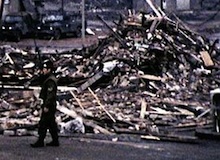
The memories of the 15 McGurk’s bar victims have been vindicated by a new report on the atrocity, but relatives of the dead and injured are still angry over a shocking response to the report by the current PSNI police chief Matt Baggott.
The North’s Police Ombudsman Al Hutchinson claimed on Monday that the RUC police’s allegations that the Provisional IRA destroyed McGurk’s bar in an IRA ‘own goal’ was due to an “investigative bias”.
The ombudsman claimed this “bias” prevented a genuine investigation by the RUC of the bombing that killed 15 people and injured more than 16.
This “bias” fell short of actual collusion, he declared. He also said in his 80-page report that he found no evidence that the RUC directly assisted the loyalist death squad responsible for the bombing.
The authorities’ suggestion that the bombing was an IRA bomb which exploded prematurely -- conveying the impression that some of those killed or injured were culpable -- caused great distress to the bereaved and injured.
“They were innocent victims whose memory was besmirched for many years by the slur that they were bombers,” the families said.
Among the fatalities on the evening of Saturday, December 4th, 1971 were Philomena McGurk, wife of the owner Patrick, and their 14-year-old daughter Maria. Mrs McGurk’s brother, John Colton, and a 13-year-old schoolboy, James Cromie, also died in the attack.
Last July, those bereaved and injured in the bombing compelled Mr Hutchinson to withdraw his original report amid outrage over his statement that the RUC has conducted a “reasonably thorough investigation”.
He refused to resign, but has admitted that in 1971, the RUC falsely briefed the British government and the media that the IRA were responsible.
However, Mr Hutchinson controversially sought to justify the RUC’s failure to engage in any real investigation of the massacre.
“The police investigation had a clear predisposition to the erroneous ‘own goal’ theory. This was perhaps in some way understandable given the extent of IRA bombings and attacks at the time,” he said.
It was not until five years after the bombing that the RUC officially admitted that loyalists were responsible.
In 1978 a loyalist, Robert Campbell, was convicted of the bombing. It is understood that he is still alive and living in Britain. Four other loyalists were suspected of involvement. None of them were ever questioned about the bombing.
Mr Hutchinson denied there had been a cover-up.
He claimed the RUC had failed to conduct an “effective investigation of the information, which it had received in 1976, that the convicted man and other members of the UVF had been responsible for the bombing.”
He also called on the (now PSNI) chief Matt Baggott to make amends for the “erroneous” report that victims of the bombings were culpable in the atrocity.
Baggott accepted that none of those who died were guilty of planting the bomb, but refused to admit even the faint allegation of “bias”.
“Other reports have reached differing judgments regarding the initial RUC investigation. None of them have concluded that there was evidence of investigatory bias,” he said.
While acknowledging the “hurt” caused to victims’ relatives by the false reports, he stopped far short of apologising.
The Pat Finucane Centre and British-Irish Rights Watch, which backed the families, condemned Matt Baggott’s response.
“The families will be hurt and re-traumatised by the chief constable’s statement,” they said.
“He has missed an opportunity to lift a shadow from their lives and set the record straight.”
Addressing a press conference as Police Ombudsman Al Hutchinson released his report, relatives said that the pain of their bereavement nearly 40 years ago was compounded “by a deliberate lie, created in the aftermath of their horrific deaths, that our loved ones had been responsible for the explosion”.
They said that the IRA ‘own-goal’ claim had “added intolerable insult to our unbearable injury and grief”.
Patrick McGurk, who lost his mother Philomena, sister Maria and uncle John Colton said a “dark cloud had been lifted” by the removal of “an official lie”.
He linked the success of their campaign to clear their relatives’ names to the vindication of the Bloody Sunday relatives by the Saville report last June.
Mr McGurk’s son Chris then read out the list of the pub bombing dead and declared each of them innocent in turn.
Pat Irvine, who lost her mother in the explosion, said simply: “We’ve won. The truth was told today. This is the total exoneration of the victims, the survivors and all of the families, they were completely innocent.”
She said Mr Hutchinson’s report showed there was “collusion, corruption and obstruction of evidence”. She said, however, she disagreed with the ombudsman’s finding that the RUC’s actions “fell short” of collusion.
She cited Mr Hutchinson’s criticisms of the original police investigation and quoted his conclusions that it was “selective and consequently misleading”, that it “failed to investigate effectively the information received” and that it suffered from “serious failure”. These, she said, were tantamount to collusion.
Tommy McCready said there was “a pressing need for a legal definition [of collusion] from a senior judge”. In common with others he said many questions remained to be answered, pointing out that Mr Hutchinson’s investigators were limited to examining the role played by police officers.
“The British army was key at the time,” Mr McCready added, adding that its senior officers had to be made accountable.
He insisted that he, along with other relatives, was “not out for revenge, only for the truth”.
Robert McClenaghan said: “There are questions for the British army, for the unionist government and the ministery of defence.”
Sinn Fein north Belfast assembly member Gerry Kelly has called on Mr Baggott to meet the victims’ families.
“What the families deserved from the chief constable was an apology. What they got was a chief constable trying to defend the indefensible.”
![[Irish Republican News]](https://republican-news.org/graphics/title_gifs/rn.gif)
![[Irish Republican News]](https://republican-news.org/graphics/title_gifs/harp.gif)

